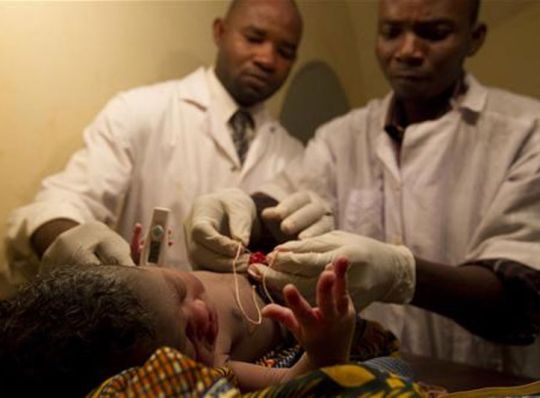UNICEF chief urges action to stop unfolding crisis for children in the Sahel
UNICEF chief urges action to stop unfolding crisis for children in the Sahel
Malian infants have low birth weights, linked to inadequate maternal care, malnutrition and endemic poverty. Photo: UNICEF
The head of the United Nations Children’s Fund (UNICEF) called today on the global community to take action to prevent one million children in the Sahel region of West and Central Africa from becoming severely malnourished.
“The region is vast, the challenge is great and the window is closing,” said Executive Director Anthony Lake. “To prevent a wide-scale emergency in the Sahel, UNICEF and our partners in this effort must begin at once to fill the pipeline with life-sustaining supplies to the region before it is too late.”
Mr. Lake stressed that a significant number of children in the Sahel already suffer from malnutrition, making them extremely vulnerable and susceptible to any reduction in the quantity and nutritional quality of the food they consume.
The region is vast, the challenge is great and the window is closing.
He underscored the urgency to act before the ‘lean season’ when food runs out due to inadequate rain or poor harvests, which can start as early as March in some of the countries across the Sahelian belt.
“Specially developed ready-to-use therapeutic foods are the best way to treat severe acute malnutrition among children under five so they have a chance to survive and recover,” Mr. Lake said. “The biggest challenge we face now is getting sufficient amounts of these critical foods to children as the need increases in the coming months,” he added.
“The children at risk today in the Sahel are not mere statistics by which we may measure the magnitude of a potential humanitarian disaster. They are individual girls and boys, and each has the right to survive, to thrive and to contribute to their societies. We must not fail them.”
Earlier this month UNICEF appealed for $65.7 million to respond to the crisis. It is currently distributing emergency stocks in affected countries such as Niger, where an estimated 33,600 children under the age of five are at risk.
###
About UNICEF
UNICEF works in 190 countries and territories to help children survive and thrive, from early childhood through adolescence. The world’s largest provider of vaccines for developing countries, UNICEF supports child health and nutrition, good water and sanitation, quality basic education for all boys and girls, and the protection of children from violence, exploitation, and AIDS. UNICEF is funded entirely by the voluntary contributions of individuals, businesses, foundations and governments. For more information about UNICEF and its work visit: www.unicef.org
###
> United Nations (UN).
 The United Nations was established on 24 October 1945 by 51 countries committed to preserving peace through international cooperation and collective security. Today, nearly every nation in the world belongs to the UN: membership totals 192 countries.
The United Nations was established on 24 October 1945 by 51 countries committed to preserving peace through international cooperation and collective security. Today, nearly every nation in the world belongs to the UN: membership totals 192 countries.
When States become Members of the United Nations, they agree to accept the obligations of the UN Charter, an international treaty that sets out basic principles of international relations. According to the Charter, the UN has four purposes:
- to maintain international peace and security;
- to develop friendly relations among nations;
- to cooperate in solving international problems and in promoting respect for human rights;
- and to be a centre for harmonizing the actions of nations.
###
* The above story is adapted from materials provided by United Nations (UN)
** More information at United Nations (UN)





















